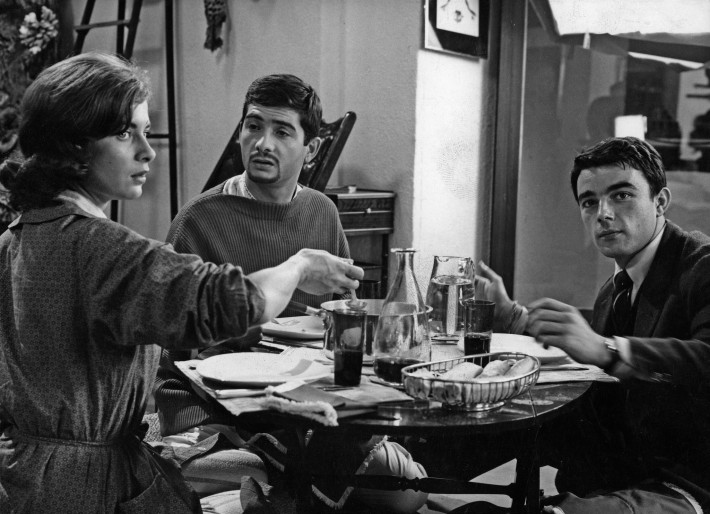2013. DVD. Blu-ray or DVD. Le Beau Serge (1959) and Les Cousins (1960). 99 minutes and 109 minutes respectively (plus extras). Eureka Home Video / Master of Cinema series. Certificate 12. Recommended price: £19.99 each
 About the Reviewer: Dr Brian Hoyle lectures in film studies at the University of Dundee and is currently completing a monograph on the films of John Boorman and researching articles on Ken Russell and the Pre-Raphaelites; Music in the films of Powell and Pressburger and Benjamin Britten at the BBC. He has also recently contributed entries on 'British Art Cinema' and several key British art films to Intellect Press' forthcoming Directory of British Cinema.
E-mail: B.P.Hoyle@dundee.ac.uk
About the Reviewer: Dr Brian Hoyle lectures in film studies at the University of Dundee and is currently completing a monograph on the films of John Boorman and researching articles on Ken Russell and the Pre-Raphaelites; Music in the films of Powell and Pressburger and Benjamin Britten at the BBC. He has also recently contributed entries on 'British Art Cinema' and several key British art films to Intellect Press' forthcoming Directory of British Cinema.
E-mail: B.P.Hoyle@dundee.ac.uk
It’s hard to believe that it has taken so long for Le Beau Serge (1959) and Les Cousins (1960), the first two films of Claude Chabrol, and the works that essentially launched the French New Wave, to be released on a digital home cinema format. Fortunately, these Masters of Cinema DVDs and Blu-Rays (available separately) from Eureka justify the long wait.
Conventional wisdom often sees the latter film, with its Hitchcockian overtones and cruelly Darwinian worldview, as the first true Chabrol film. However, viewing the films back-to-back makes one question this assumption. Indeed, Le Beau Serge may seem more overtly Catholic that his later work, and perhaps closer to early Rossellini or Robert Bresson’s Diary of a Country Priest than anything by Hitchcock or Lang, but one still gets the sense that Chabrol emerged fully formed. Many of the director’s hallmarks - the fascination with doubles, unstable friendships and marriages, class divide, the sense of moral ambiguity, and the scalpel-sharp dissection of French provincial life - are already present and correct. This is clearly a film by the man who would go on to make masterpieces like Le Boucher (1970) and La Cérémonie (1995). Moreover, Le Beau Serge and Les Cousins are unquestionably companion pieces, a sort of diptych about doubles, which were shot in rapid succession with the same two stars (Gérard Blain and Jean-Claude Brialy).
The first film sees Brialy’s character return to the tiny village where he grew up after a long absence to find that his childhood friend, Serge, is an alcoholic, trapped in a loveless marriage and bent on self-destruction. In the second film the two actors switch roles and Blain plays the sympathetic, hard-working student who travels to Paris to stay with his cousin, who has grown amoral and decadent during his time in the city. What set these independent productions apart from other French films of the time was the use of little-known and non-professional actors, location filming, their focus on the problems of a young and somewhat disillusioned post-war generation and their director’s willingness to bend the conventional approach to camerawork and editing. However, while there are some virtuoso moments, perhaps most notably a dizzying series of 360 degree pans around Gérard Blain’s room in Les Cousins as his overworked character has a breakdown to the strains of Tristan and Isolde, such flourishes are the exception to the rule; and while the characters and early 60s student milieu of Les Cousins might feel slightly modish and dated now, Chabrol’s direction never does.

Indeed, aside from the excellent performances by the male leads and Bernadette Lafont and Juliette Mayniel as their respective love interests in the two films, what really impresses here is the rigour and maturity to Chabrol’s direction. Indeed, in the lovingly detailed two-part documentary about the making of these films (which is split across the two discs) Charbol explains that, for him, every cut and movement of the camera has to be justified in terms of the story. The films bear this dictum out.
Aside from this excellent documentary, which leaves you in no doubt of the importance of these films, and Chabrol’s place in the pantheon, both the DVD and the Blu-Ray offer theatrical trailers, and a detailed booklet with interviews and production stills. However, perhaps the most instructive extras are a pair of short films, both taken from multi-director portmanteau features he took part in later in his career. (The confidence Chabrol exhibits in Le Beau Serge is all the more remarkable given that he, unlike his New Wave comrades Truffaut, Godard and Rohmer, did not test himself by making a short film before embarking on his debut feature). Le Beau Serge is packaged with ‘Avarice’, Chabrol’s contribution to a 1962 French film in which seven directors illustrated the one of the Deadly Sins. Les Cousins includes ‘The Man Who Sold the Eiffel Tower’, taken from an international multi-director film, The World’s Most Beautiful Frauds (1964), which features Catherine Deneuve and Jean-Pierre Cassel. While neither work is particularly substantial, both are very droll reminders of Chabrol’s often overlooked gift for comedy, and the fact that he was always more than just a director of thrillers.
The quality of the extras and the discs confirm that the Masters of Cinema series can rival America’s Criterion Collection for quality
The quality of the extras and the discs confirm that the Masters of Cinema series can rival America’s Criterion Collection for quality. The films, the shorts, and even the trailers are presented here in pristine new restorations from Gaumont, which bring out the best in Henri Dacaë’s superb black and white cinematography. The subtitles are thankfully optional throughout. These are essential releases which all cineastes will want to own and which begin to make up for the rather lacklustre treatment of Chabrol’s back catalogue on DVD and Blu-Ray so far.
Dr Brian Hoyle